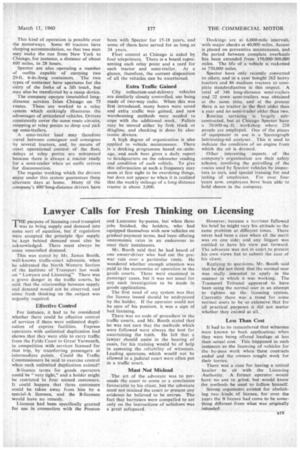Lawyer Calls for Fresh Thinking on Licensing
Page 85

If you've noticed an error in this article please click here to report it so we can fix it.
THE purpose of licensing road transport i was to bring supply and demand into some sort of equation, but if regulation were accepted the principle tbat supply be kept behind demand must also be acknowledged. There must always be some unsatisfied demand.
This was stated by Mr. James Booth, well-known traffic-court advocate, when he addressed the North Western Section of the Institute of Transport last week on "Lawyers and Licensing:' There was a grave danger in the traffic courts, he said, that the relationship between supply and demand would not be observed, and some fresh thinking on the subject was urgently required.
Effective Control
For instance, it had to be considered whether there could be effective control of services if there were unlimited duplication of express facilities. Express operators with unlimited duplication had shown that they were able to carry traffic from the Fylde Coast to Great Yarmouth, in competition with services licensed for that trip, by transferring passengers at intermediate points. Could the Traffic Commissioners be said to exercise control when such unlimited duplication existed?
B-licence terms for goods. operators could be "very tight," and a holder might be restricted to four named customers. It could happen that these customers could be taken away from him by a special-A licensee, and the B.-licensee would have no remedy.
Licences had been specifically granted for use in connection with the Preston and Lancaster by-passes, but when these jobs finished, the holders, who had equipped themselves with. new vehicles on gradual-payment terms, had been offering uneconomic rates in an endeavour to meet their instalments.
Mr. Booth said that he had heard of one owner-driver who had cut the prewar rate over a particular route. He wondered whether enough attention was paid to the economics of operation in the goods courts. These were examined in passenger cases, but it was not usual for any such investigation to be made in goods applications.
The first need of any system was that the licence issued should be understood by the holder. If the operator coutd not be sure of his position, it was a sign of bad licensing.
There was no code of procedure in the traffic courts, and Mr. Booth stated that he was not sure that the methods which were followed were always the best (or ascertaining the truth. He felt that a lawyer should assist in the hearing of cases, for his training would be of help in assessing the .reliability of witnesses. Leading questions, which would not be allowed in a judicial court were often put in a traffic court.
Must Not Mislead
The art of the advocate was •to persuade the court to come to a conclusion favourable to his client, but the advocate must not mislead the court or present any evidence he believed to be untrue. The fact that barristers were compelled to act only on the instructions of solicitors was a great safeguard. However, because a barrister followed his brief he might vary his attitude to the same problem at different. times. There never had been a case when all the merit was on one side; and any litigant was entitled to have his view put forward. The advocate was not in court to present his own views but to submit the case of his client.
Replying to questions, Mr. Booth said that he did not think that the normal user was really intended to apply in the manner in which it was working. The Transport Tribunal appeared to have been using the normal user in an attempt to tighten up the licensing system. Currently there was a trend for some normal users to be so extensive that for all practical purposes it did not matter whether they existed at all.
Less Than Cost It had to be remembered that witnesses were known to hack applications when they were being offered haulage at less than actual cost. This happened in such instances as the licensing of vehicles for the by-pass work when these contracts ended and the owners sought. work for their lorries.
There was a case for having a retired haulier to sit with the Licensing Authority. A former operator would have no axe to grind, hut would know the methods he used to follow himself. Strong arguments existed for abolishing two . kinds Of licence, for over the years the B licence had come to be something different from what was originally intended.




































































































































